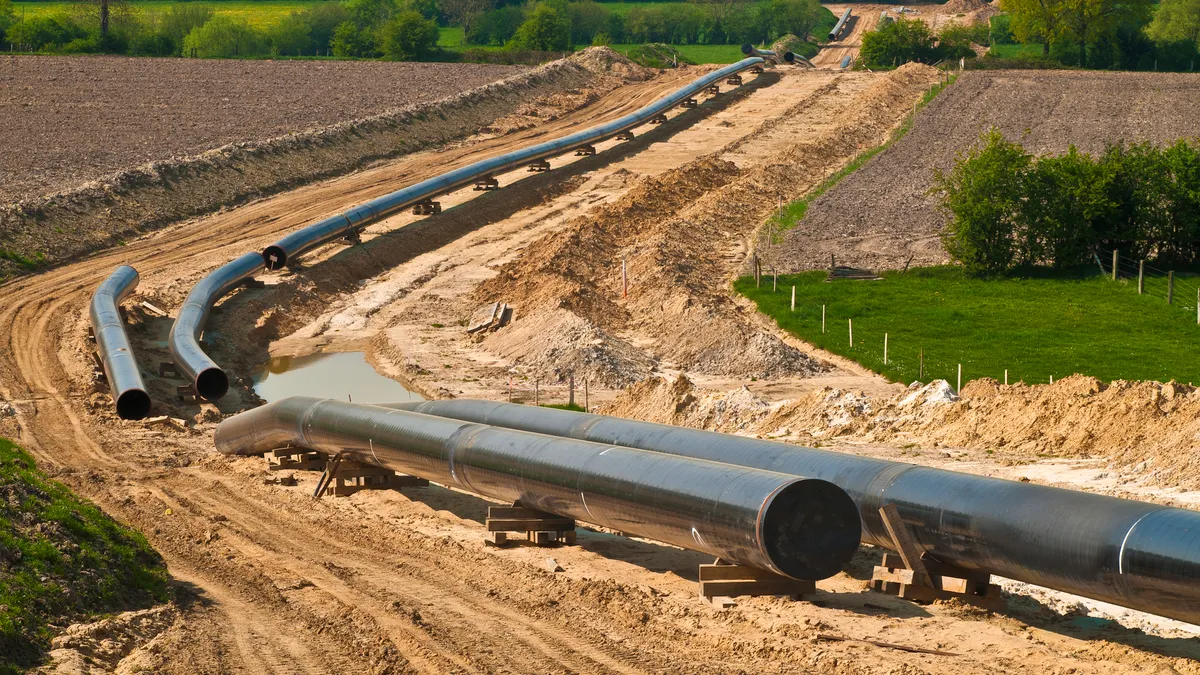The Federal Energy Regulatory Commission on Thursday put on hold its month-old framework for reviewing natural gas pipeline and liquefied natural gas proposals and their effects on greenhouse gas emissions.
Under criticism from pipeline companies, natural gas utilities and members of Congress, FERC unanimously decided to take comments on the policy statements, which are now deemed drafts. Unlike the withdrawn policies, any new review framework will not affect previously proposed projects. In addtion, pending pipeline and LNG applications will be considered under criteria established in 1999 and by court precedent, according to FERC Chairman Richard Glick.
FERC issued the revised policies in mid-February on a 3-2 vote, partly in response to a string of court orders that faulted the agency for how it reviewed proposed gas projects. The new policies included expanded criteria for deciding whether the facilities are needed and how they could affect people and the environment. At the time, Glick said he hoped the new policies would allow future gas infrastructure decisions to withstand court review.
"However, over the last month, I've had discussions with numerous pipeline and LNG companies, and I know my colleagues have as well," Glick said Thursday during FERC's monthly meeting. "What I generally heard is that the policy statements raise additional questions that could benefit from further clarification."
Despite different views among FERC's commissioners, Glick told reporters after the meeting he believed they could reach an agreement on how the agency should review gas projects.
"I still remain positive … I think we can get to yes, in many cases," Glick said. "We have to hear more, get a better record, which we're going to do."
Taking comments on the draft policy statements may give FERC more time to work on other issues such as cybersecurity, energy markets, as well as transmission planning, cost allocation and interconnection reform, according to Glick.
"We're getting bogged down a bit on this," Glick said. "Hopefully, we can reach consensus among the commissioners and move forward not only on this issue, but the other very important work we have to do."
The vote to put the revised review framework on hold was "difficult," partly because landowners and other stakeholders who often lack the resources to take part in agency proceedings will have to go through an additional round of comments, FERC Commissioner Allison Clements said.
"Nonetheless, based on the engagement since last month's meeting, I have concluded that we cannot move forward to effectively or efficiently consider and process individual project applications under the new policies without stronger agreement across the commission," Clements said. "Attempting to apply the policies without clearer points of agreement on approach would be unproductive."
The review framework released last month didn't provide its intended certainty or clarity, according to FERC Commissioner Willie Phillips. "I hope our vote today signals that we are committed to working together," Phillips said.
Comments on the draft policy statements are due by April 25 and reply comments are due May 25.
Politics didn't play a role in FERC's decision to pull back on its revised gas infrastructure review policies, according to Glick, whose term ends June 30. If he is renominated, he would have to be approved by the Senate Energy and Natural Resources Committee, which is led by Sen. Joe Manchin, D-W.Va., a critic of FERC's revised pipeline and LNG review policy.
"I don't make decisions based on politics," Glick said. "I fully expect that my colleagues don't do that either… I'm going to follow the facts of the law."
Manchin, groups respond
FERC's decision to pause its revised review framework "was a course-correction from their previous partisanship and I appreciate their willingness to address the significant concerns raised by many members of the Senate Energy and Natural Resources Committee," Manchin said Friday in a statement.
FERC needs "clear and predictable policies that strike the right balance between energy security, affordability and environmental considerations," Manchin said.
The Interstate Natural Gas Association of America (INGAA) supported FERC's decision to reconsider how it reviews gas projects.
"FERC's decision to revisit the statements with additional comments will hopefully provide further clarity and predictability for a timely natural gas infrastructure certification process," Amy Andryszak, INGAA president and CEO said in a statement.
An issue that has been lost in the reaction to FERC's updated review framework is that the agency and pipeline industry keep losing in court, according to Moneen Nasmith, Earthjustice senior attorney.
Under the agency's decision Thursday, FERC is reverting to a status quo in its gas infrastructure reviews that is "fundamentally broken," Nasmith said Friday.
It's clear that federal law requires FERC to consider how the gas infrastructure affects the climate and environmental justice, according to Gillian Giannetti, senior attorney for the Sustainable FERC Project at the Natural Resources Defense Council.
"While the commission is going out of its way to address the complaints of the gas industry, FERC needs a gas policy that takes into account greenhouse gas emissions, environmental justice effects, and landowner concerns," Giannetti said in a statement.
FERC approves three pipeline projects
Using its old review policy, FERC unanimously approved three pipeline projects at its meeting in decisions that hadn't been released by press time.
One set of projects will provide 2 million dekatherms per day (dth/d) of gas for the Venture Global Plaquemines LNG project in Louisiana.
A project planned by Columbia Gulf Transmission will increase pipeline capacity in Louisiana by 183,000 dth/d.
Iroquois Gas Transmission System's proposal to upgrade its system will increase capacity into the New York City area by 125,000 dth/d. The project is partly in response to a plan by New York City to eliminate the use of heating oil.
Glick said FERC could have assessed whether the carbon emissions from the projects were "significant" under the National Environmental Policy Act. He said he would have found the emissions to be "less than significant," noting the New York project is expected to reduce carbon emissions.
In his media briefing, Glick said FERC was well aware of the geopolitical significance of its gas infrastructure decisions, especially in light of Russia's invasion of Ukraine and Europe's efforts to reduce gas imports from Russia.
There are seven LNG export terminals in the U.S. and two are being built, according to FERC. The agency has approved 13 export projects that aren't under construction.
It's unclear why the projects aren't being built, according to Glick. Based on conversations with LNG company officials, potential LNG buyers are reluctant to enter into long-term contracts to buy the fuel, which makes it impossible to finance the export facilities, Glick told reporters.
FERC upholds SEEM, New York decisions
In other action, FERC upheld previous decisions on the Southeast Energy Exchange Market, a bi-lateral trading platform developed by utilities across the Southeast that is slated to start this summer.
In a dissent on one of the decisions, Clements reiterated her concern that the market rules discriminate against non-members and therefore erect an illegal barrier to open access.
"Today's order blesses an arrangement that runs contrary to fundamental principles enshrined in Order No. 888 and which flow from the [Federal Power Act:] transmission services must be open, accessible, and provided without undue discrimination," Clements said.
FERC will monitor SEEM to ensure open access, Glick told reporters. "If there are any allegations of manipulation, allegations of undue discrimination, we're going to act upon that," Glick said.
Also, FERC upheld a decision in September to dismiss a complaint by New York's transmission owners, who wanted to be able to earn a return on their investment for interconnection upgrades. The utilities behind the complaint failed to show they aren't adequately compensated for the risks they face from owning and operating the upgrades, FERC said.
On the hydroelectric front, FERC issued a preliminary permit for Alabama Power to study the feasibility of building a 1,600-MW closed-loop pumped storage project in Etowah and St. Clair counties, Alabama.























